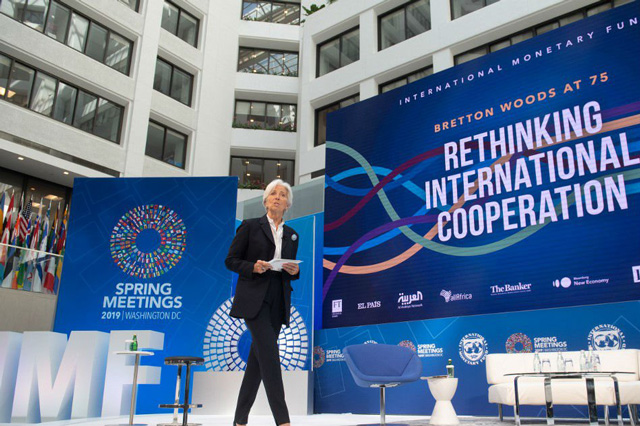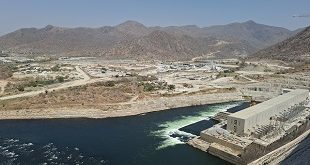
Washington, United States | AFP | At the critical moment of a Hollywood movie starring A-lister Sandra Bullock, Bolivia’s newly-elected president calls in the International Monetary Fund to bail out the poverty-stricken country, violating a campaign promise.
The streets erupt in violent protest.
The movie, “Our Brand is Crisis,” is a fictionalized version of the 2002 Bolivian elections and it drastically simplified the situation. But the writers knew the IMF would be unquestionably accepted as the arch enemy of the people.
After 75 years putting out financial fires around the world, the IMF and World Bank face criticism for repeatedly failing to prevent crises and for making things worse for the people they were meant to help.
That makes them easy scapegoats.
Even if the criticism is not always entirely fair — no one blames the doctor for prescribing a painful but life-saving treatment — the institutions have been trying to rebrand themselves in recent years, putting more emphasis publicly on protecting vulnerable members of society in their lending programs.
But they will need more than a better communications strategy as they contend with a wave of anti-globalization sentiment and technological transformation — while also helping Africa through a transition requiring massive investment in infrastructure and job creation just to keep up with population growth.
The challenges “are huge,” World Bank President David Malpass told AFP in an interview.
The IMF and World Bank were created July 22, 1944 in the shadow of World War II to help rebuild Europe and later Japan, and to try to head off the kind of economic strife that had led to the war.
“The original concept of reconstruction and development … was clarified to include poverty alleviation as the bank grew,” Malpass said.
– Dismal record –
On the surface, their record, especially for the IMF, seems dismal, with each of the prior three decades marked by a severe crisis: the Latin American debt crisis in the 1980s, the Asian and Russian crises in the 1990s and the global financial crisis in 2007, which begat the Great Recession that still looms over the world economy today.
In each case, the damage lasted for a decade or more and the IMF was blamed for inflicting even more pain with its rigid demands and policy advice that, according to the fund’s harshest critics, too often favored corporate interests in the rich countries over the poor nations in trouble.
But at the same time extreme poverty has plummeted worldwide — falling by a billion people since 1990.
“In the history of the world there has never been so much progress in improving people’s lives as we have seen in the last 75 years,” said Masood Ahmed, who worked alternately either at the IMF or World Bank for nearly half their existences.
But the institutions missed the problems growing beneath the surface.
The world “was doing so well on the macro level, and there were so many people being lifted out of poverty, that we glossed over the fact that there were many people who were increasingly uncomfortable with the pace of change,” said Ahmed, who leads the Center for Global Development, an anti-poverty research organization.
“And I think we’re paying a bit of a price for that now.”
Without prompting, Malpass volunteered criticism of the “Washington consensus” — sneering shorthand for policies imposed on developing nations that centered on privatization and steep cuts in government spending and employment.
The consensus was this policy menu would work for every country in crisis — advice that flies in the face of economic theory calling for spending to increase during a downturn.
Instead, Malpass said he wants to focus the World Bank’s programs on what is best for each country.
“I want it to be more and more effective at helping countries find a path to growth and to good outcomes for the people of those countries.”
– Greater representation –
Agustin Carstens, former head of the Mexican central bank and once a deputy managing director of the IMF, credits the organizations with providing needed oversight and policy advice that has prevented “many more crises.”
The problem is that, when the IMF is called in, “it goes into an economy at the most difficult time,” when all other sources of financing have closed and there are no good options.
But he worries the institutions have failed to adapt to the changing global economy, giving only lip service to the far greater weight of countries like China and India.
With IMF Managing Director Christine Lagarde set to leave her post on September 12 to take over the European Central Bank, the old powers are poised to continue the tradition of naming a European to lead the fund while an American runs the World Bank, despite past pledges to change.
Carstens, who was a finalist to take over the IMF leadership in 2011 when Lagarde was selected, said the reform is urgently needed to “give more legitimacy to the advice that the fund provides.”
 The Independent Uganda: You get the Truth we Pay the Price
The Independent Uganda: You get the Truth we Pay the Price


